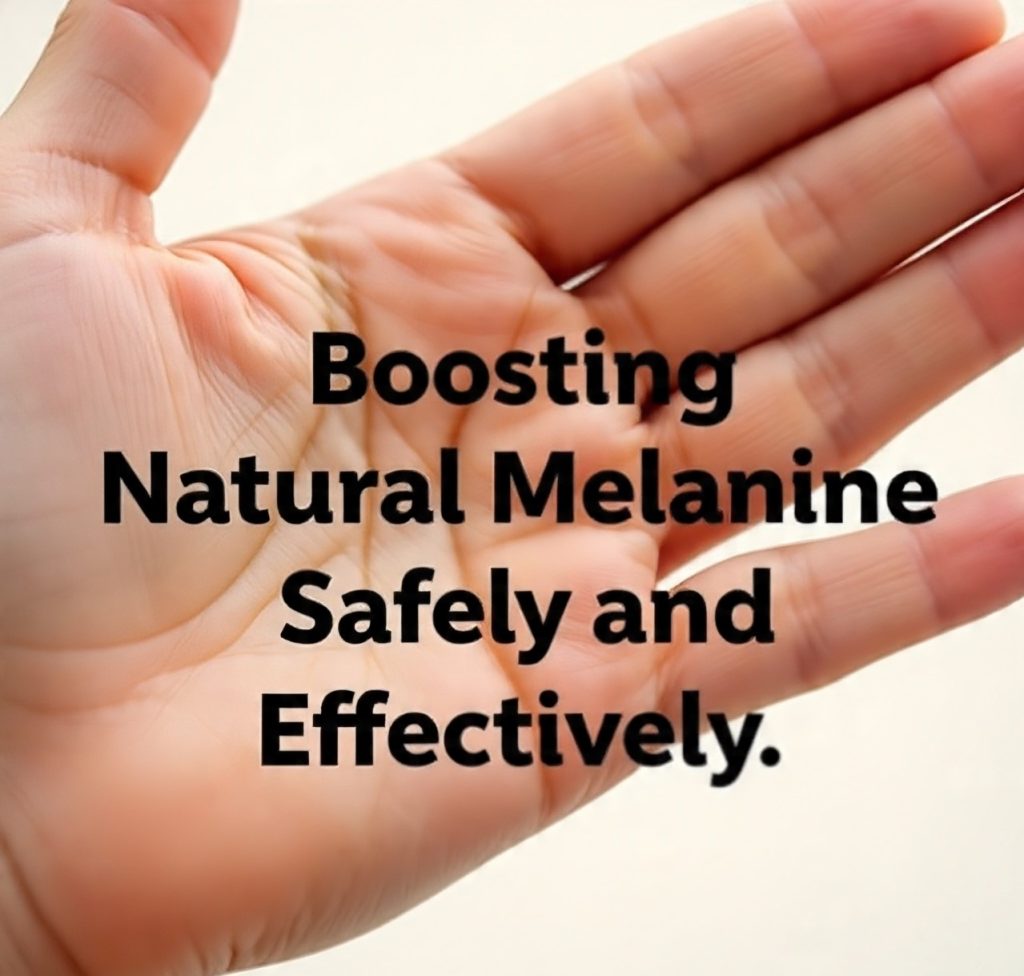Discover safe and natural ways to boost Melanine in your skin for better protection, glow, and even tone. Simple tips that work no harsh chemicals needed.
What is Melanine and Why Does It Matter?
Melanine is a natural pigment found in your skin, hair, and eyes. It’s what gives color to your complexion and protects your skin from sun damage by absorbing harmful UV rays. People with higher Melanine levels generally have better natural protection from the sun and fewer signs of premature aging.(Cleveland Clinic).
Benefits of Healthy Melanine Levels
Boosting Melanine naturally isn’t just about skin tone it offers several other health and beauty benefits:
- Better UV Protection Helps prevent sunburn and skin cancer.
- Even Skin Tone Reduces patchy skin or uneven pigmentation.
- Slower Aging Protects against wrinkles and fine lines.
- Eye & Hair Health Supports eye protection and prevents early greying of hair.
Safe and Effective Ways to Boost Melanine Naturally
Let’s dive into simple methods that can help you improve your natural Melanine production, no expensive treatments needed.
1. Eat Melanine-Boosting Foods
What you eat affects your skin. Some nutrients are key for Melanine production:
- Copper-rich foods: Mushrooms, nuts, seeds, shellfish.
- Tyrosine (an amino acid): Chicken, soy, dairy, avocado.
- Vitamin A: Carrots, sweet potatoes, leafy greens.
- Vitamin E and C: Citrus fruits, almonds, sunflower seeds.
These nutrients work together to support melanin synthesis in the skin. (NIH, Healthline).
2. Get Moderate Sun Exposure
Sunlight naturally triggers Melanine production. Just 10–15 minutes of daily sun exposure (without sunscreen) on your arms or legs can stimulate Melanine production.
Don’t overdo it. Too much sun exposure can harm the skin and cause burns. (Harvard Health).
3. Use Natural Oils
Some oils may help promote Melanine and protect your skin:
- Coconut oil Keeps skin moisturized.
- Olive oil Rich in antioxidants and vitamin E.
- Argan oil helps reduce inflammation and protect pigment cells.
Apply after cleansing to keep your skin nourished and support natural Melanine growth.
4. Avoid Harsh Skin Products
Some skincare products contain bleach or chemicals that reduce Melanine. Avoid:
- Whitening creams with hydroquinone or mercury.
- Harsh exfoliators that damage skin layers.
- Peels that thin out the skin.
Instead, choose gentle, pH-balanced, Melanine-friendly skincare.(FDA)
5. Stay Hydrated
Water helps every cell in your body function better including Melanine-producing cells. Aim for 6–8 glasses a day. This also helps prevent dry, dull skin.
6. Manage Stress
Chronic stress affects hormones that control Melanine levels. Regular exercise, deep breathing, and restful sleep can keep your body balanced and your pigment production stable.
7. Don’t Skip Sleep
During sleep, your body repairs and regenerates including the cells responsible for Melanine production. Adults should aim for 7–9 hours of quality sleep each night.
Natural Supplements That Support Melanine Production
If you need extra help, some supplements may promote healthy Melanine levels:
- L-Tyrosine An amino acid necessary for producing Melanine.
- Copper supplementsEssential for enzyme function.
- Antioxidants Like vitamin C and E to prevent oxidative damage
Always consult a doctor before starting any supplement.
Melanine Myths to Avoid
There are many false claims online about Melanine. Let’s clear them up:
- You can’t inject or apply pure Melanine into the skin.
- Eating dark foods like chocolate won’t directly increase Melanine.
- Pills that claim “skin darkening overnight” are often unsafe and unregulated.(American Academy of Dermatology).
When to See a Dermatologist
Sometimes, uneven Melanine production can lead to:
- Hyperpigmentation (too much Melanine in spots)
- Hypopigmentation (loss of Melanine in patches)
- Melasma or vitiligo
If you notice sudden skin color changes or patches, consult a skin expert.
Melanine Matters: A Dutch Perspective from The Treatment Bar
According to The Treatment Bar NL, the role of Melanine is often misunderstood. Many people chase a tan for cosmetic reasons, but the real function of Melanine is protection. It shields your skin from harmful UV radiation and responds when your skin is stressed whether by sunlight, inflammation, or injury. Boosting Melanine should not be about beauty enhancement but about supporting your skin’s natural defense system.
The Dutch skin health philosophy aligns with a growing global shift toward skin protection over artificial beautification, encouraging you to work with your skin, not against it.
Final Tips for Supporting Melanine Naturally
- Eat colorful, nutrient-rich foods.
- Get safe sun exposure for a short, regular time outdoors.
- Keep skin moisturized and avoid harsh chemicals.
- Manage stress and prioritize rest.
- Use trusted, gentle skincare.
Boosting Melanine isn’t about becoming darker, it’s about supporting your body’s natural balance and maintaining skin health from within.
FAQs on Boosting Melanine Naturally
1. What is Melanine exactly?
Melanine is a natural pigment in your skin, hair, and eyes that gives them color and protects against sun damage.
2. Can I increase my Melanine permanently?
No method guarantees a permanent increase. But you can naturally support your Melanine production through food, sun, and lifestyle.
3. How long does it take to see changes?
It varies per person. With consistent natural habits, some changes may be noticeable in 2–4 weeks.
4. Do supplements work for Melanine?
Certain supplements like L-Tyrosine and copper may help but should be taken with medical advice.
5. Will drinking water help boost Melanine?
Yes, water helps your skin cells work better, including those that produce Melanine.
6. Are there any side effects to increasing Melanine naturally?
No side effects if done through natural, safe methods like food, sunlight, and hydration.
7. Can I apply Melanine cream directly to my skin?
No. There is no approved topical Melanine cream. Some products claim it, but they often don’t work.
8. What should I avoid to keep my Melanine healthy?
Avoid bleaching creams, harsh exfoliants, and overexposure to sun.
9. Is it safe to tan for more Melanine?
Short sun exposure is safe. Tanning beds and prolonged sunbathing are not recommended.
10. Does age affect Melanine?
Yes. Melanine production may slow with age, but healthy habits can help maintain levels longer.









